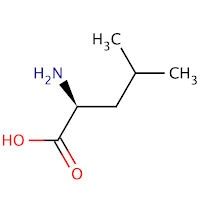Pre- & Post Workout Leucine Supplementation Worthless?
Last Wednesday Stocks et.al. (Stocks. 14 Jul 2010) published a study on "The Effects of Adding Leucine to Pre and Postexercise Carbohydrate Beverages on Acute Muscle Recovery From Resistance Training". For many of my readers it may come as a surprise that they did not find any improvement in "acute muscle recovery and squat performance during both initial testing and during a subsequent exercise bout 72 hours".
This is contrary to all advertised effects of leucine-supplementation, with leucine (structure see image at the right; source: HMDB) being praised as the no.1 among the ergogenic branched chain amino acid (BCAAs).
Although the dose (22.5mg/kg body weight > ~ 1.7g for a 150 pound athlete) used in this study was relatively low, it is yet remarkable that there was no observable effect on performance or recovery. Past studies mostly done with BCAA formulations (leucine, isoleucine, valin) provided more encouraging results.
Thus, the question remains: Is it the synergism of leucine, isoleucine and valine (the three BCAAs) that triggers the positive effect on workout performance? Or, what is another, but maybe as important question to ask: Is supplementation with isolated amino acids necessary, if athletes consume a high protein diet? The latter question could well explain the unequivocal results, which suggest leucine (and BCAA supplementation) has more pronounced effects on untrained subjects or recreational athletes than on trained strength athletes (the study by Stocks et.al. was done on 17 male and 3 female resistance trained subjects) of whom we all expect to carefully monitor their daily protein intake.
In addition, a comparison of short term vs. long term effects in strength athletes would be of interest, as well, because some of leucine's benefits (resulting from improved protein metabolism) may show only after months of continuous supplementation.
This is contrary to all advertised effects of leucine-supplementation, with leucine (structure see image at the right; source: HMDB) being praised as the no.1 among the ergogenic branched chain amino acid (BCAAs).
Although the dose (22.5mg/kg body weight > ~ 1.7g for a 150 pound athlete) used in this study was relatively low, it is yet remarkable that there was no observable effect on performance or recovery. Past studies mostly done with BCAA formulations (leucine, isoleucine, valin) provided more encouraging results.
Thus, the question remains: Is it the synergism of leucine, isoleucine and valine (the three BCAAs) that triggers the positive effect on workout performance? Or, what is another, but maybe as important question to ask: Is supplementation with isolated amino acids necessary, if athletes consume a high protein diet? The latter question could well explain the unequivocal results, which suggest leucine (and BCAA supplementation) has more pronounced effects on untrained subjects or recreational athletes than on trained strength athletes (the study by Stocks et.al. was done on 17 male and 3 female resistance trained subjects) of whom we all expect to carefully monitor their daily protein intake.
In addition, a comparison of short term vs. long term effects in strength athletes would be of interest, as well, because some of leucine's benefits (resulting from improved protein metabolism) may show only after months of continuous supplementation.



